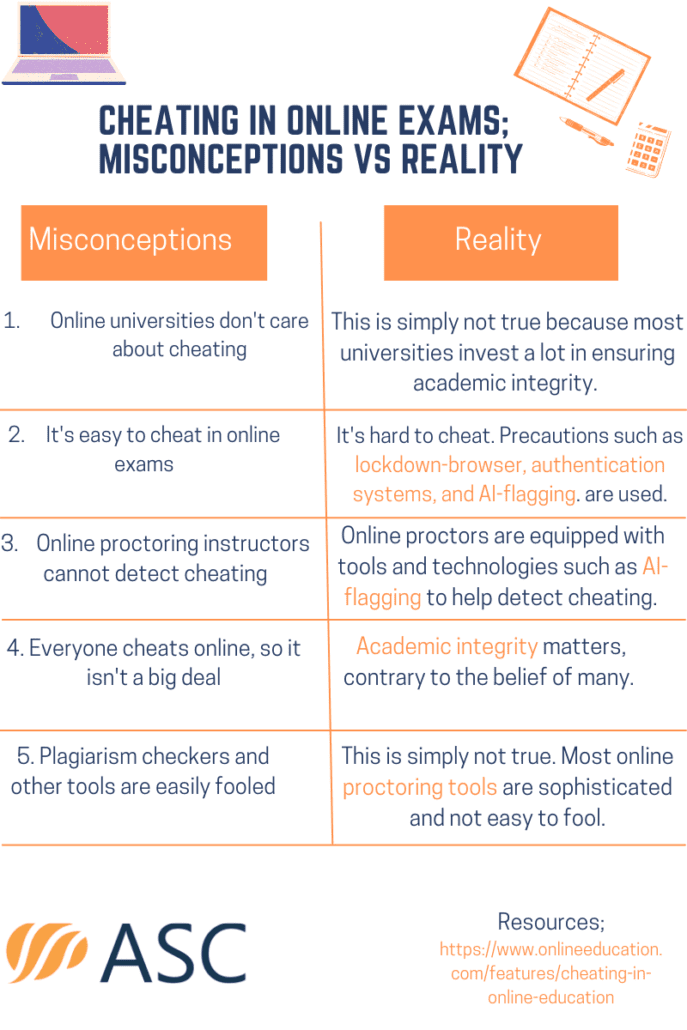
How Students Cheat in Online Exams and How to Catch Them
Content
- What is exam cheating?
- 7 ways of cheating in online exams and how to catch or deter them
- 1. Impersonation (proxy tester)
- 2. The ‘Old school’
- 3. Advanced tech gadgets and software
- 4. “Brain Dumps” and sharing of test content
- 5. The ‘Water or Bathroom’ break
- 6. Help from family, experts, and friends
- 7. Googling or ChatGPT-ing the answer
- Tips for students
- Data Forensics
- Conclusion
Student exam cheating has always been a major concern, even before the major shift to remote proctoring and online exams during the pandemic. According to a study done in 2007, 60.8% of college students admitted to cheating while a whopping 95% of these admitted not getting caught! The Wikipedia page on the 2012 Harvard cheating scandal provides detailed insights into a significant case of academic dishonesty involving over 100 students accused of collaborating inappropriately on a take-home exam, highlighting the challenges even prestigious institutions face in upholding academic integrity. In 2020, things took a turn for the worse as many institutions struggled to implement digital transformation as a response to the pandemic. Coupled with the common misconception that cheating in online exams is easier than traditional exams, everything became catastrophic.
However, this is not a true reflection of cheating in online exams. Is cheating in online exams easy as the students perceive it to be? No. Just like in-person exams, online exams have some loopholes that students can exploit for academic gains. But, these loopholes can be mitigated using the right online assessment software and strategies. Perhaps the most important technology is remote proctoring, which has seen an incredible boom during the pandemic.
This article provides two things:
- Overview of how students cheat in online tests
- Provide you with tips and ideas on how to deter and detect cheating
What is exam cheating?

Cheating refers to actual, intended, or attempted deception and/or dishonesty in relation to academic or employment-related assessments. It is only one part of the larger issue of test integrity; there are other issues, such as teacher help on K-12 summative tests or “faking good” on personality assessments. This in turn is part of the larger scope of academic dishonesty.
There are two pathways to dealing with academic dishonesty and cheating: Deter and Detect.
- Deter: Make it harder to cheat, or put punishment policies in place that make examinees avoid cheating. Examples include lockdown browser and remote proctoring.
- Detect: Find cheating that has already happened, such as psychometric forensics (download free software for that here), or reviewing a proctor video.
With exam security, experts follow the adage of “A pound of prevention is worth an ounce of cure” so deterrence is important. However, before going forward, let’s define academic dishonesty and cheating, and discuss some definitions.
Need an exam platform with more security, or want to discuss security with a psychometrician?
7 ways of cheating in online exams and how to catch or deter them
1. Impersonation (proxy tester)
Impersonation refers to the act of asking or hiring someone else to take an exam on your behalf. This is not a new trick and has also been used in traditional assessments. In online assessments, the risks are even higher. Impersonation can take place in two stages of the examination delivery process; before and during the assessments.
Before the assessments, students share their login details with the imposter. The login details vary depending on the software in use. However, some online proctoring software easily makes this impossible by using advanced identification features such as biometrics or facial recognition systems. Impersonation during the exam process can take place in many ways. One trick used by students is providing remote access to their imposters through tools such as virtual machines. This sounds like something pulled out of a spy movie, but you wouldn’t believe what students are willing to do to avoid failure.
How to curb impersonation in online exams
- Using authentication technologies such as biometric systems and two-factor authentication to verify registered candidates.
- Use online assessment software with the AI-flagging feature. AI flagging feature enables instructors to spot and act on suspicious activities in exam video and audio recordings. Some suspicious behavior includes extra audio voices and unusual body language.
- Use software such as BioSig-ID which uses keystroke analysis to identify metrics such as typing patterns, style, rhythm, and pressure. These are then used to create a unique persona that is almost impossible to replicate.
2. The ‘Old school’
 The ‘old school’ is popular in traditional exams. It includes tricks such as writing the notes in your palms or sticky notes and using sign language to communicate with classmates. Many institutions make a mistake of assuming that these tricks cannot be used in online exams. However, these tricks can be used in online proctored exams, but remote proctoring can catch it.
The ‘old school’ is popular in traditional exams. It includes tricks such as writing the notes in your palms or sticky notes and using sign language to communicate with classmates. Many institutions make a mistake of assuming that these tricks cannot be used in online exams. However, these tricks can be used in online proctored exams, but remote proctoring can catch it.
How to deal with the ‘old-school tricks’
Most of the old-school tricks of cheating can be identified with online proctoring software. In many cases, AI-based flagging is sufficient. But for high-stakes exams, you definitely need a human proctor in real time, because that not only protects the integrity of that examinee’s score, but greatly deters them from stealing the test content.
3. Advanced tech gadgets and software
The advancement of technology has turned some students into ‘James Bond’ types of cheaters. They rely on sophisticated tech gadgets and software to cheat in online proctored exams. Here are some creative ways students use software and technology to try and outwit the system;
- Tech gadgets such as smartwatches and microphones– These devices enable students to communicate about the exam with people from the outside. Smartwatches can also be used to store answers to the tests.
- Using remote software– This is one of the most popular ways of cheating in online assessments. Students install remote software to connect them with help from the outside. Some even use web versions of applications such as WhatsApp to cheat in exams.
- Projectors or cameras– This is another way students can cheat in online proctored exams. Students may set up cameras on their desks and have their family or friends project the answers in front of them.
- Screen Mirroring– Using certain tools, students can grant monitor access to friends and family in the room, who can help them with the test.
How to stop the ‘tech-savvy’ students from cheating
- Use lock-down browser to stop the student from surfing the web or using any software, apart from taking the exam.
- Use AI flagging to recognize and act on suspicious behavior
- Collaborate with a remote proctoring provider that offers audio and video proctoring services. You can also add a human proctor to the equation to increase assessment security. Good proctoring services will use two cameras, require room scans, lock down the computer, and other approaches to addressing tech-based cheating.
4. “Brain Dumps” and sharing of test content

In many cases, this form of student exam cheating can be referred to as the ‘charity’ of academic infidelity. This is popular in traditional exams where students share exam questions with others who have not taken the exam yet, because they feel they are being helpful – even if it could end up hurting themselves. Candidates may take screenshots or use cameras to record questions and share them with others, or simply try to memorize items.
How to curb sharing of test content
Use ASC’s lockdown browser functionality to eliminate the ability to take screenshots and screen recording. Proctoring services will flag if students are taking pictures with their phone. Psychometric forensics will look for unusual time patterns.
5. The ‘Water or Bathroom’ break
A student pretends to have a ‘bathroom emergency’ or ‘bad connection’ and the first thing they do after logging off the system is getting access to a device or textbook to cheat. To achieve high standards of academic integrity, it’s important for institutions not to take chances.
How to deal with the ‘Water or Bathroom Break’
This is a tricky one, as there is no knowing when the excuses are genuine or not. However, the institutions should try to come up with strict examination policies for such circumstances. For instance, the time for bathroom breaks should be limited, such as there being a 200 item test with two 100-item sections and a 10 minute break between, so there is no chance to come back to items.
6. Help from family, experts, and friends
This is a method that many students consider ‘safe’. There are several ways family, experts, and friends can help students cheat in online assessments. One way is having a family member or friend in the same room a student is taking the exam. The student can share the questions and the friend or family member can browse the internet and provide answers.
Another way students can cheat is through ‘expert tutors’. Students can hire tutors to help them with the exams or take them on their behalf. In fact, there has been an increased demand for online academic tutors.
How to stop students from getting external help
- Tighten up your authentication process by using technologies such as biometrics systems and two-factor authentication. This prevents students from receiving external help from experts.
- Utilize lockdown browser to make sure that students don’t have access to remote software or have the freedom to surf the internet.
- Use AI flagging to make sure that the candidates don’t display suspicious behavior.
7. Googling or ChatGPT-ing the answer
Doesn’t access to a computer and the internet provide students with endless opportunities to cheat in online proctored tests? Yes, if the test is not proctored or locked down. Fortunately, this method is relatively easy to address.
How to stop students from using the internet during an exam.
Use ASC’s lockdown browser function to stop students from accessing other websites or resources on personal devices. Utilize proctoring services like MonitorEDU or Proctor360. Do not allow cell phones to be present at the desk.
Tips for students
Read that candidate/student handbook: This actually VERY important. It will not only tell you what to expect, but also tell you important information about the exam itself.
Practice test: If available, make sure to do this. It will help you understand the process, and feel much more confident come Exam Day.
Download beforehand: Some software for an online proctored exam will require you to download something, such as a secure browser or Chrome plugin. Make sure to do this before Exam Day. Sometimes, it is part of the Practice Test.
Watch instructional videos: Videos like the example above will help you see what to expect.
System check: Similarly, some software to deliver an online proctored exam will perform an automated system check to make sure that you have enough internet bandwidth, that your video is streaming well, etc. Do this before Exam Day, and sometimes it is also part of the Practice Test.
Know the rules: Make sure you are aware of the rules for your particular exam. Are you allowed a bottle of water? Bathroom breaks? Open-book?
Prepare the area: Once you know the rules, make sure your desk area is ready. Do you need to clean the top of your desk from all books and papers? Obtain an external webcam or microphone? Ask your roommates to leave? There are many things like this which might be required, and more than you can do in 30 seconds as you log into your exam.
Have water: If you are allowed water, make sure you have it ready, just in case.
Study: YES!!!!! Obviously, this is more important than anything else… if you actually know the material, you are more likely to pass. Cheating is not the way to go; it isn’t worth the risk if you could just take that effort and put it into actually studying.
Data Forensics
There is a distinction between primary and secondary collusion, and there are specific collusion detection indices and methods to investigate aberrant testing behavior, such as
- Responses in Common (RIC) Index,
- Errors in Common (EIC) Exam Cheating Index,
- Wollack 1997 Omega Collusion Index,
- Frary, Tideman, & Watts (1977): g2 Collusion Index,
- Harpp & Hogan (1993): Response Similarity Index,
- Harpp, Hogan, & Jennings (1996): Response Similarity Index,
- Wesolowsky (2000) Zjk Collusion Detection Index,
- Bellezza & Bellezza (1989): Error Similarity Analysis,
- Holland K Index and K Variants,
- Guttman errors.
Conclusion
Student exam cheating remains common. These are some of the popular ways in which students cheat on exams. However, these tricks and hacks should not scare you from reaping the benefits of online assessments. In fact, by using the solutions suggested in this article, we believe you can reduce the risks of cheating and achieve high standards of academic integrity. Assessment Systems regularly participates in the Conference on Test Security (COTS), to stay at the forefront of the latest strategies and technologies for preventing cheating in assessments.
Ready to minimize and deter student cheating in your online proctored exams? Contact us today and get a free consultation!
Admin
Latest posts by Admin (see all)
- What are Pre-Employment Integrity Tests? - September 30, 2024
- How Students Cheat in Online Exams and How to Catch Them - May 27, 2024
- Navigating Leadership Assessments: A Science-Backed Approach - May 17, 2024

